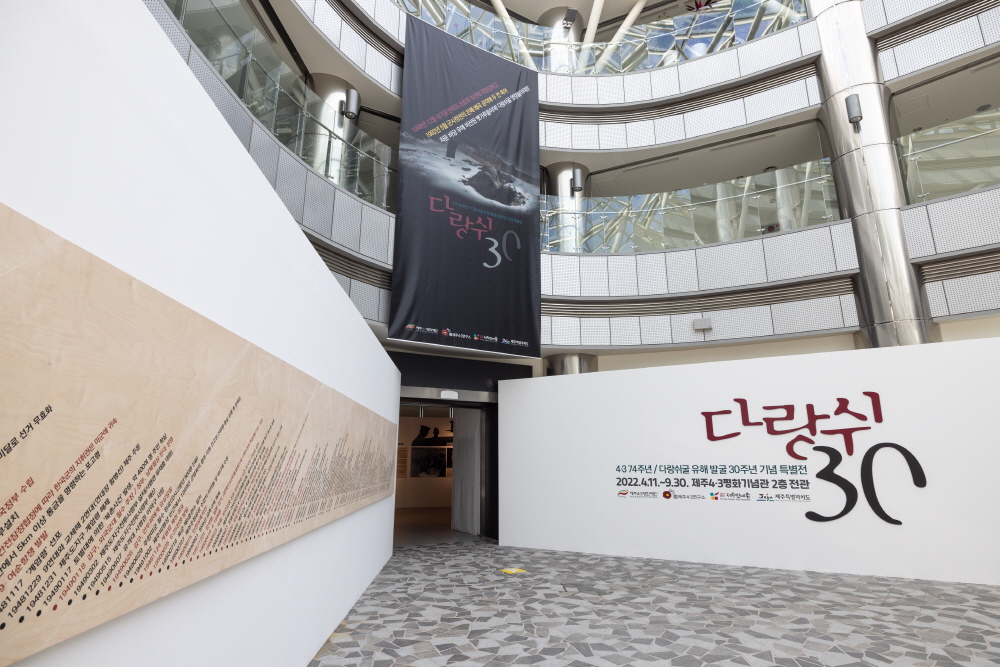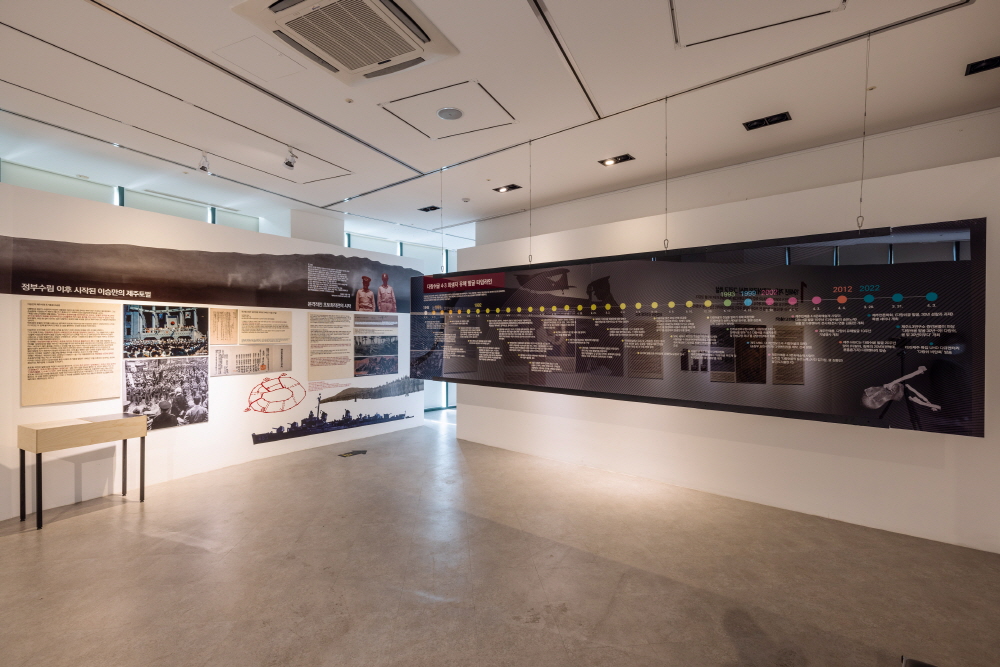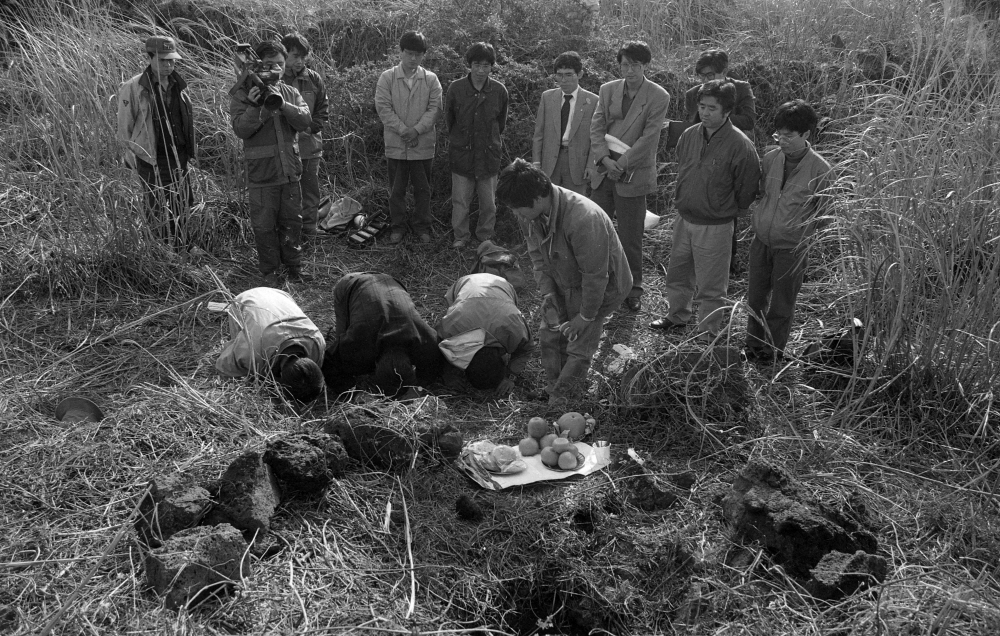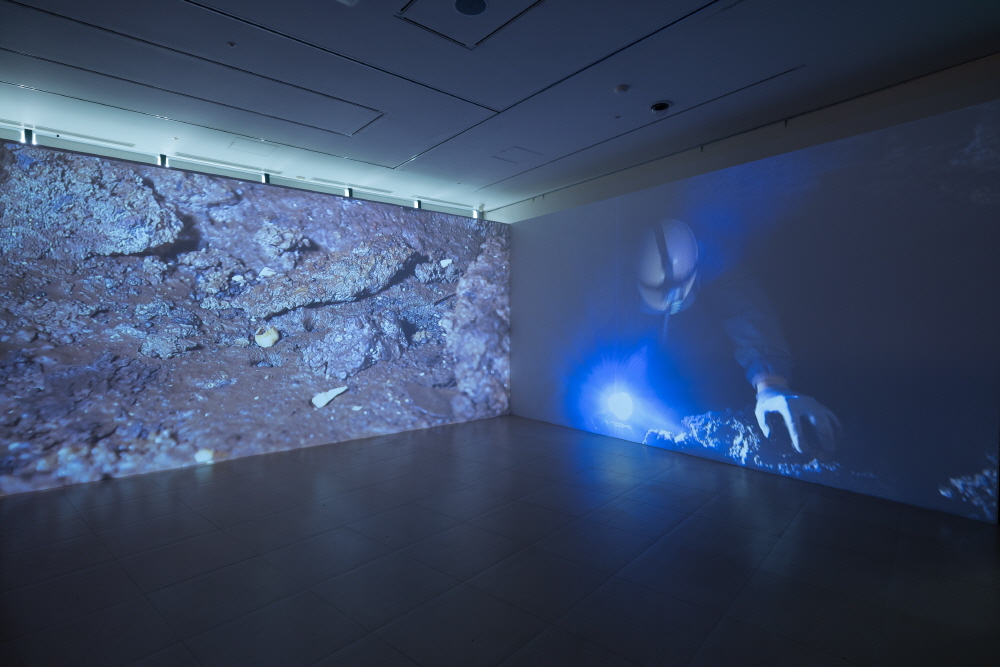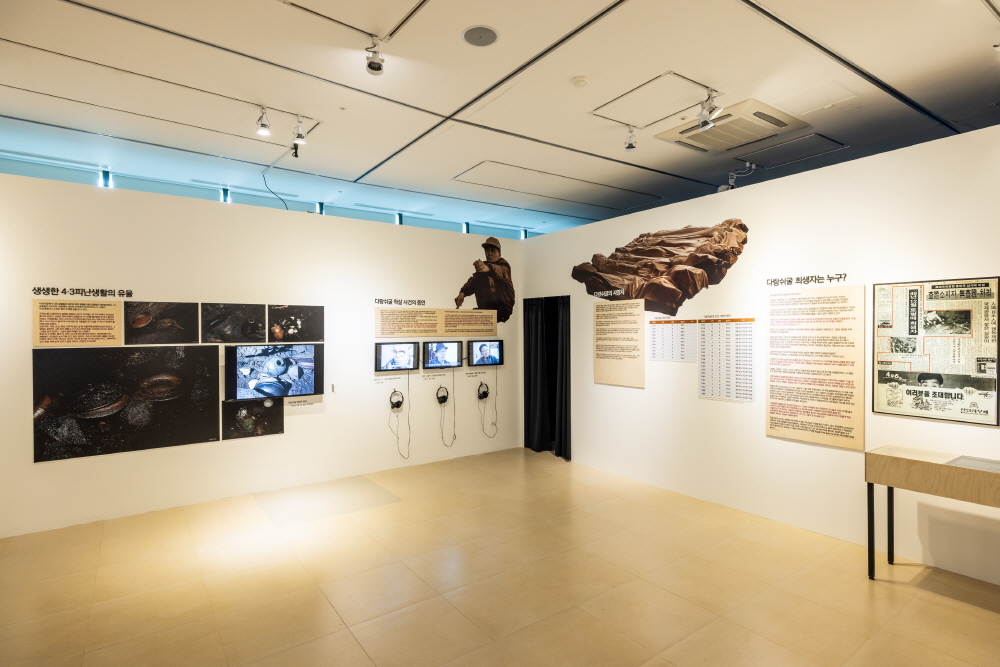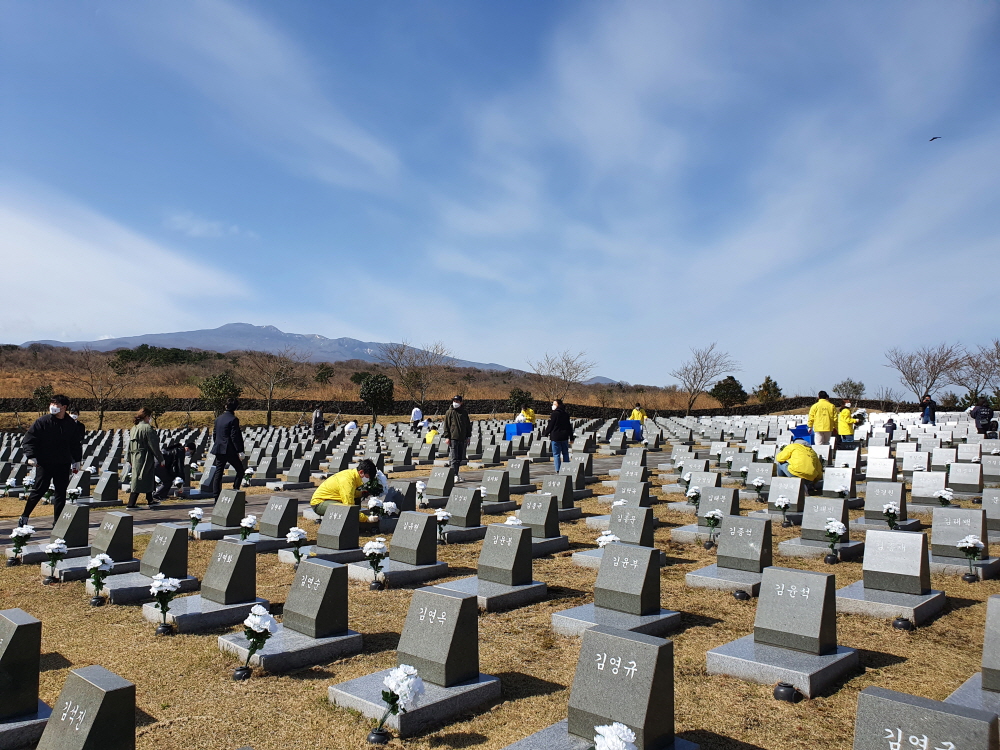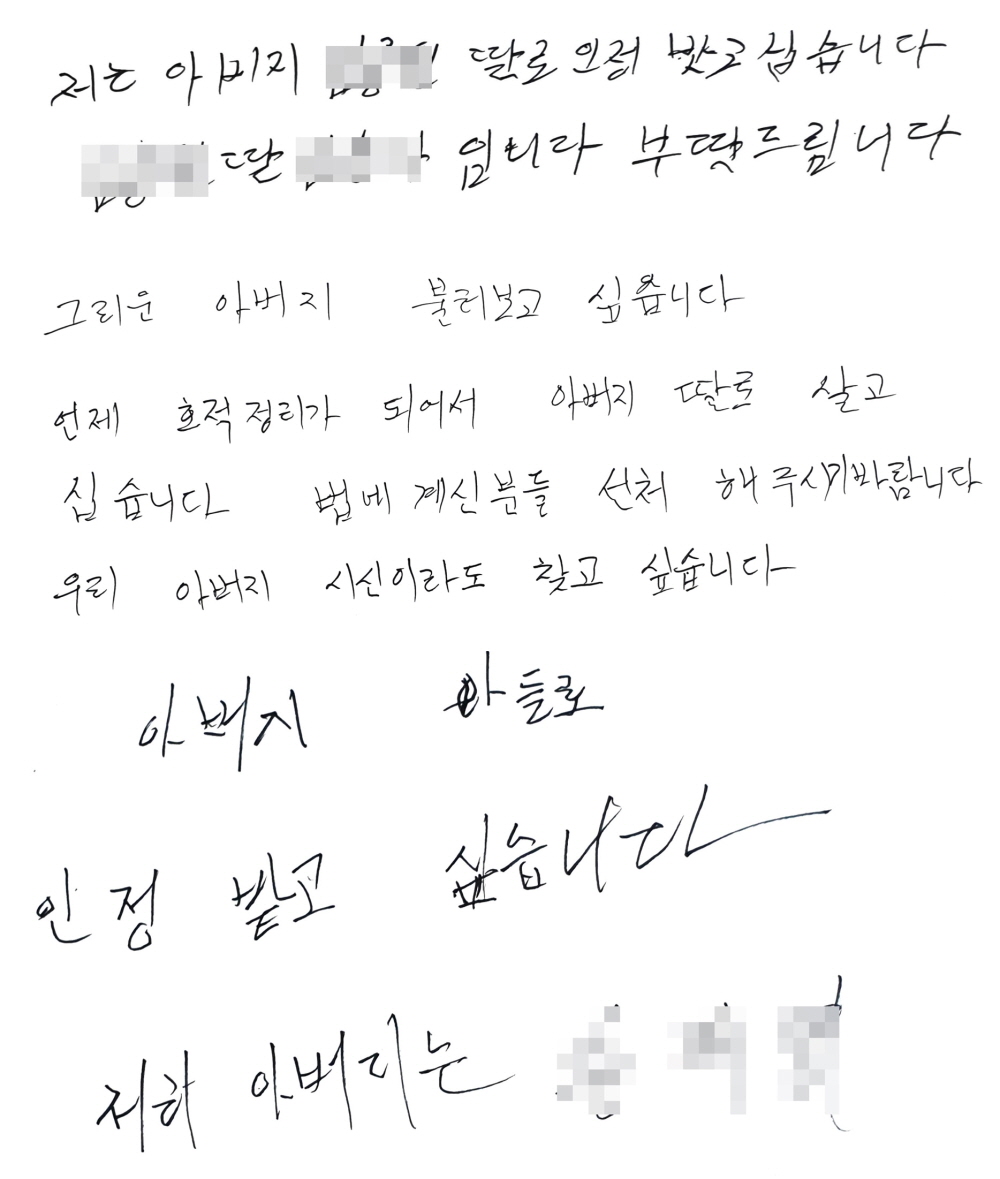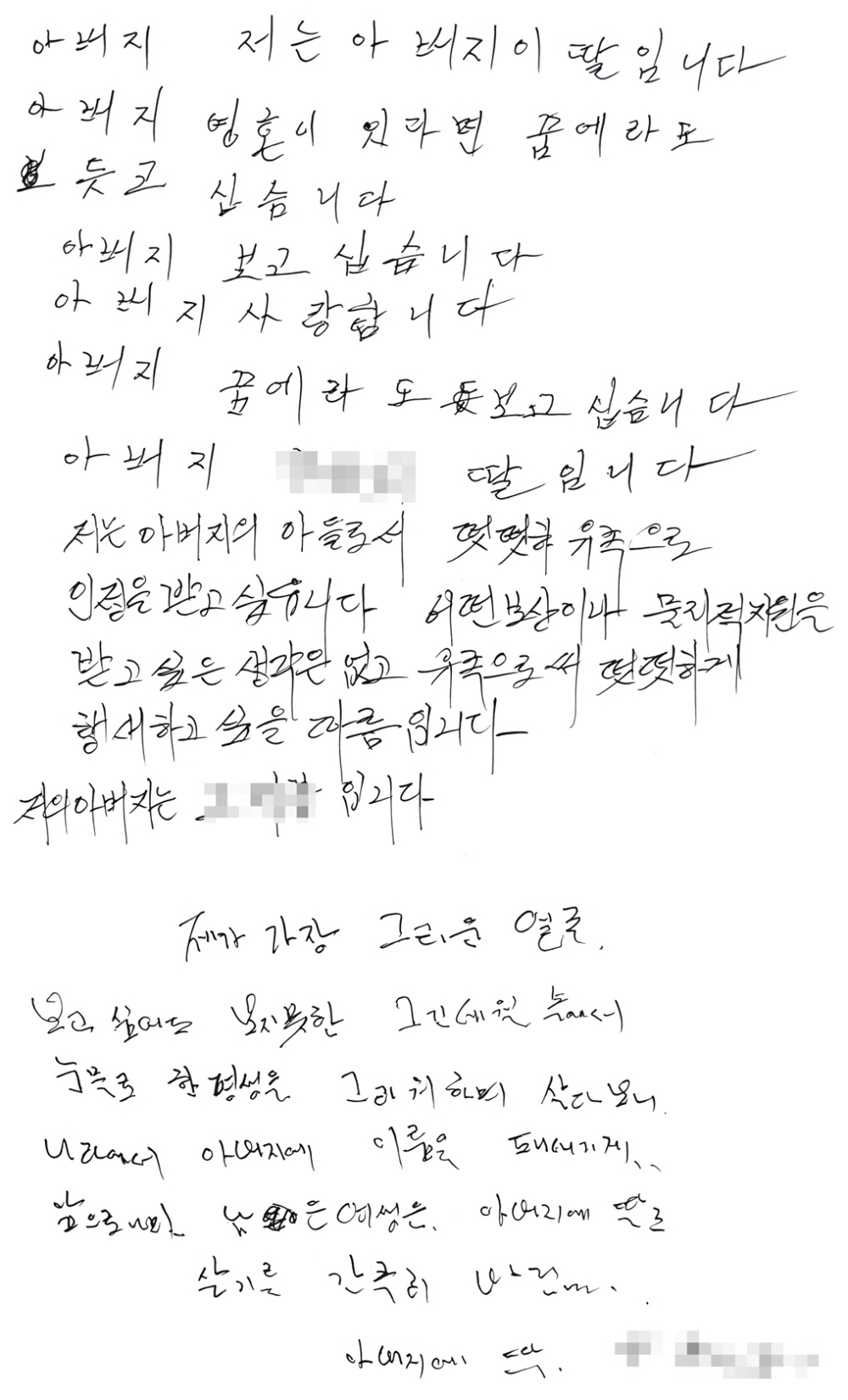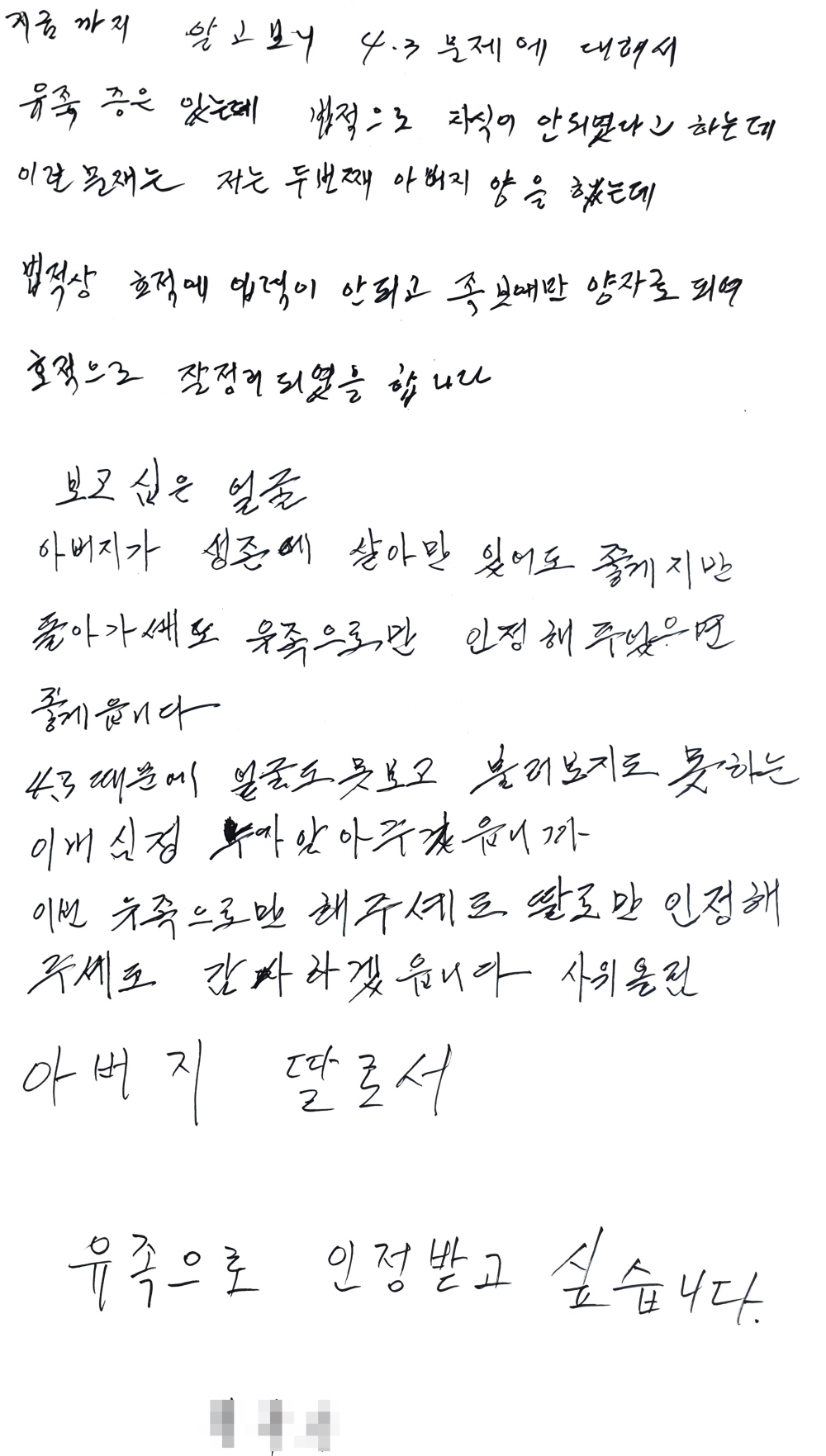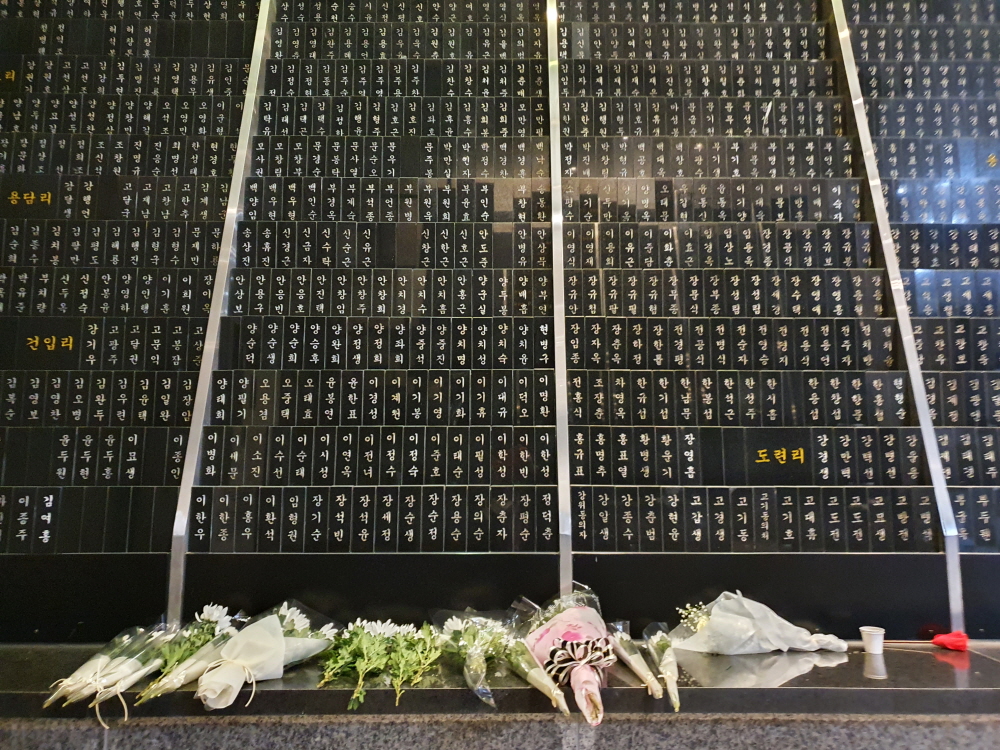[Special Report] The 74th Memorial Ceremony for the Victims of Jeju 4·3
‘Recognizing Sumbisori of 4·3 as a breath of history’
[On-the-ground] The 74th Memorial Ceremony for the Victims of Jeju 4·3 held on April 3, 2022
Article by Jeju 4·3 Peace Park Editing Office
Photographs by Jeju Provincial Office
Photographs by Kim Ki-sang and Kim Yeong-mo (4·3 Peace Park Memorial Project Team)
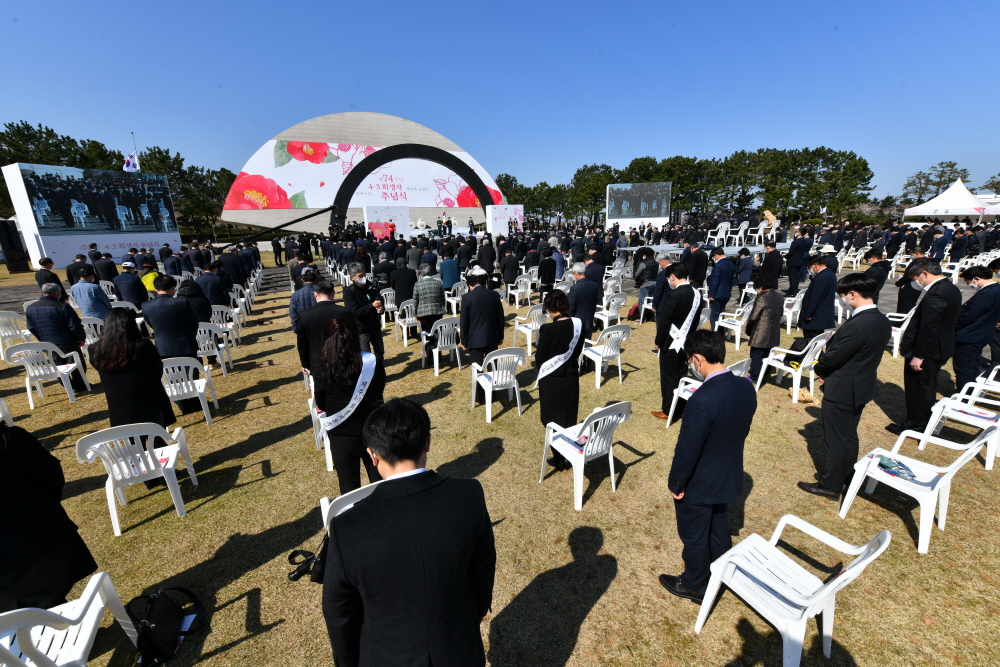
[The 74th Memorial Ceremony for the Victims of Jeju 4·3 is held.]
In the early morning of April 3, a man named Han Choon-bo, who was two years old at the time Jeju 4·3 and is now old and indisposed, visited his father’s grave marker in the Tombstone Park for the Missing of the Jeju 4·3 Peace Park.
“Born on Feb. 15, 1921, and missing since disappearing in the Yeongnam region on Sept. 21, 1951”
His great-granddaughter clearly read out the epitaph, while the elderly man, feeling a gush of emotions at hearing his father’s name “Han Yoo-saeng,” burst into tears.
“Father, I am old now. Will I be able to visit you one mor time this year and again next year? What should I do if I want to see you?”
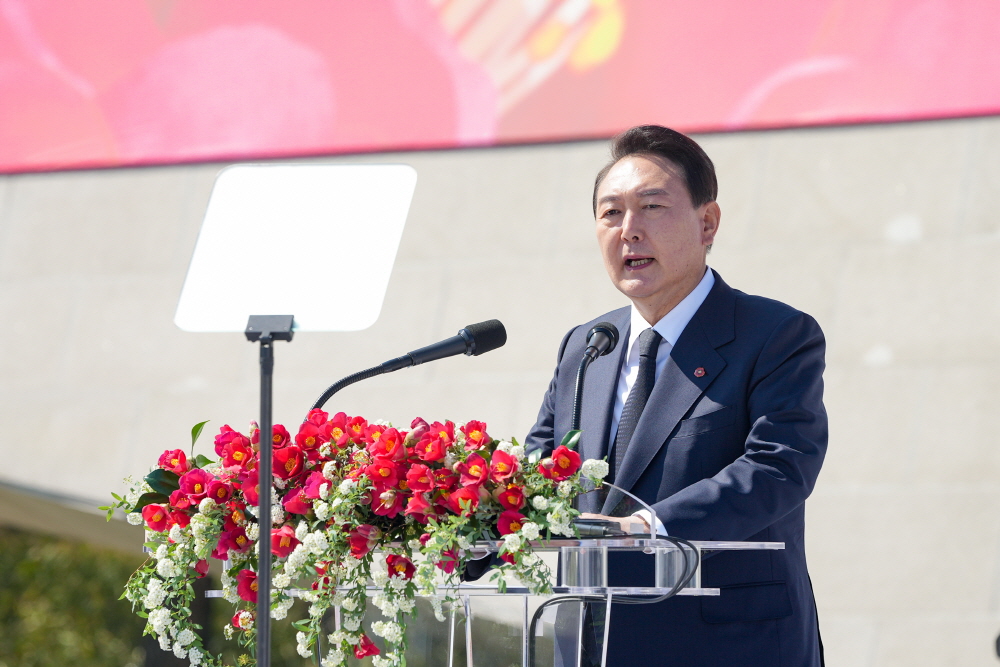
[President-elect Yoon Suk-yeol delivers his memorial address.]
As if clutching at straws, Han provided a blood sample in order to help identify his father through DNA testing. He says he knows better than anyone else the joy that victims’ families felt at the Reporting Session on the Exhumed Remains Identified as Jeju 4·3 Victims in February 2022. While desperately waiting for good news, the sorrow the man feels only deepens with every day as he knows he is running out of time and may not be alive when they do finally identify his father’s remains.
The situation is much the same for the family members of Jeju 4·3 victims, who had gathered in the Jeju 4·3 Peace Park’s Memorial Tablets Enshrinement Hall and in front of the park’s Headstone Monument Engraved with the Names of the Deceased that day. Throughout the ancestral rites, the bereaved families conjured up the memories of their loved ones while praying for the repose of their souls.
The 74th Memorial Ceremony for the Victims of Jeju 4·3, hosted by the Ministry of Public Administration and Security and the Jeju Special Self-Governing Province, was solemnly held on April 3, 2022, at the Memorial Service Square of the Jeju 4·3 Peace Park.
On behalf of the national government, Prime Ministry Kim Boo-kyum attended the memorial ceremony, along with Justice Minister Park Beom-gye. Other public officials in the audience included Ko Kyu-chang, Vice Minister of Public Administration and Security, Jung Geun-sik, Chairperson of the Truth and Reconciliation Commission Chair Jung Geun-sik, and Song Doo-hwan, Chairperson of the National Human Rights Council of Korea. The ceremony was also attended by key political figures, such as Park Ji-hyun, co-chair of the emergency steering committee of the Democratic Party of Korea, Lee Jun-seok, leader of the People Power Party, and Yeo Yeong-gug, leader of the Justice Party. The event was notable as Yoon Suk-yeol became the first President-elect to attend.
At 10 a.m., a siren sounded for one minute throughout the Jeju province, requesting a silent tribute to be paid to the Jeju 4·3 victims.
Actor Jung Tae-woo and KBS Jeju announcer Park A-reum emceed the ceremony, which was conducted under the slogan of “Recognizing Sumbisori of 4·3 as a breath of history”. The event proceeded with the screening of an opening video, a floral tribute and incense burning, the pledge of allegiance and ceremonial salute to the national flag, a silent tribute paid to the victims, memorial remarks by distinguished guests, introduction of a victim’s family, and memorial performances.
President Moon Jae-in expresses his honor for having been with the people connected to Jeju 4·3 for five years during his tenure
President-elect Yoon Suk-yeol vows to work to fully restore the reputations of the victims and bereaved families
President-elect Yoon Suk-yeol in his memorial address said, “We remember the painful history of Jeju 4·3 and each and every one of the innocent people whose lives were taken.” He then added, “It is sobering to contemplate the history of Jeju and the people of Jeju who have relied on their longing to endure the grief of losing their loved ones, without being allowed to say a single word about the injustice they had faced.”
“I want to express my sincere condolences for the victims. I also extend a word of consolation to their bereaved loved ones, who suffered as they built Jeju into an ‘island of peace’,” Yoon said.
He also stated, “Healing the pain and tending to the scars of Jeju 4·3 is our duty, as those who remember, and it is the duty of the Republic of Korea, as we seek to move into a future of reconciliation and harmony. I will work to fully restore the reputations of the victims and bereaved families of Jeju 4·3.”
“The government will take responsibility for easing the pain of the survivors and the pain of the bereaved family members and the hard times they have lived through,” he said.
President Moon Jae-in did not attend the ceremony his year, but instead sent a message. Moon attended the memorial ceremony three times during his term, in 2018, 2020, and 2021.
Moon wrote in his memorial message that spring blossomed again on the island of Jeju without fail this year, expressing his consolation and respect to the families of the Jeju 4·3 victims and the people of Jeju who rose above their grief. He also promised that efforts will be made to carry out as planned additional investigation into the truth of Jeju 4·3 and the provision of proper compensation to the victims. He said, “I solemnly hope the souls in the Darangshi Cave will be comforted by the special Darangshi Cave exhibition.” Concluding his message, he added that it was a great pleasure to be with the people related to Jeju 4·3 for five years. “I will never forget the spring in Jeju in memory of the victims,” he said.
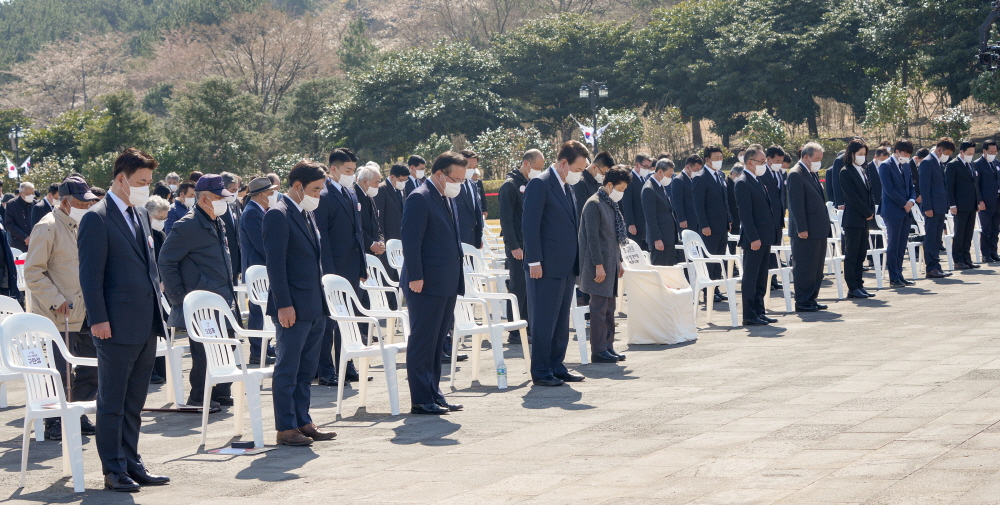
[The participants pay silent tribute.]
Prime Minister Kim Boo-kyum said, ‘Efforts will be made to smoothly process the 8th additional reporting of victims and bereaved families.’
Prime Minister Kim Boo-kyum consoled the victims and bereaved families by saying, “I pray for the repose of all the victims and express my most sincere condolences and gratitude to the surviving victims and victims’ families who have been witnesses to history so that Jeju 4·3 will not be forgotten.”
“During the 7th Additional Reporting Period for Victims and Bereaved Families in the first half of last year, 44 people were newly recognized as victims, along with the additional recognition of 4,054 bereaved family members,” he said, adding, “I will deliver the contents of the project to the next administration for the smooth implementation of the 8th round of the project, which is to start in January next year.”
He also highlighted that compensation for the Jeju 4·3 victims has become available under the revised Jeju 4·3 Special Act. “Although the provision of compensation should not be the end of support for the victims and their families, the government will have to fulfill its responsibilities until they are sufficiently compensated for the lives and years lost by state violence,” he said.
Oh Im-jong, chairman of the Association of the Bereaved Families of Jeju 4·3 Victims, said in his speech that he appreciates it that President Moon adopted the resolution of Jeju 4·3 as a national agenda, attended the memorial ceremony three times, and worked to have the revised bill on the Jeju 4·3 Special Act be passed at the National Assembly. The representative of the victims’ families also expressed his gratitude to President-elect Yoon for keeping his promise to attend the 74th memorial ceremony. Koo Man-seob, the Acting Governor of Jeju, vowed that the provincial government will take the lead in comforting the souls of the victims and healing the pain of their bereaved loved ones.
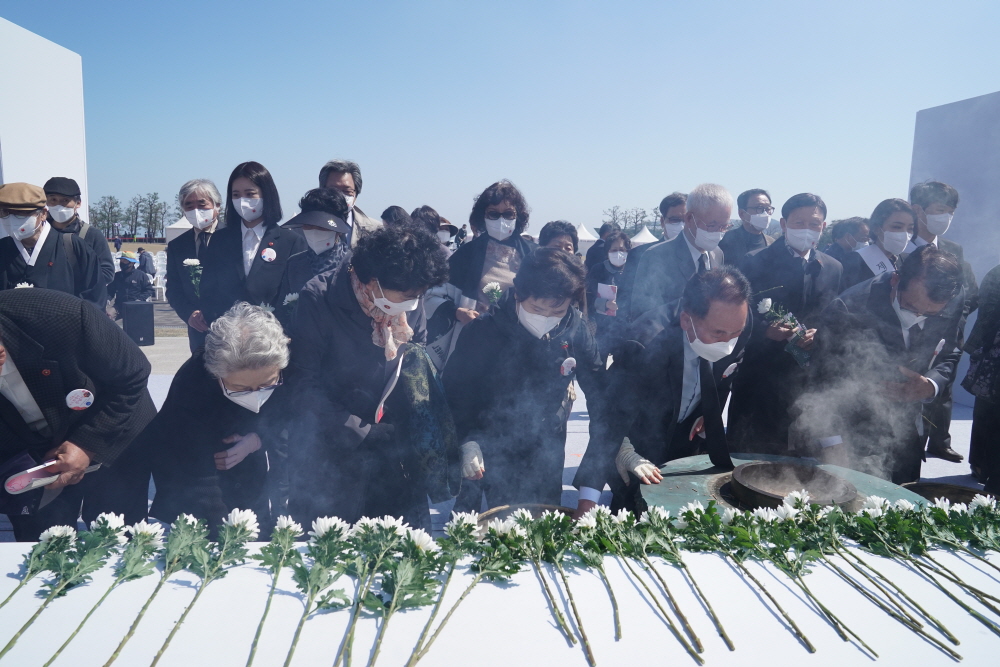
‘I believe the souls of my family members are here with me.’
This year’s event introduced the story of Kang Choon-hee (77, Samdo 2-dong, Jeju City), a first-generation family member whose grandfather, father, and brother were recognized as Jeju 4·3 victims. Her story was adopted into a one-man drama and performed by actress Park Jung-ja in front of the Memorial Service Altar of the Jeju 4·3 Peace Park, moving the victims’ families in attendance to tears.
“I lost all my family due to Jeju 4·3. My father, whose face I don’t remember, was taken somewhere by the counterinsurgency forces and has since not been heard of. My grandfather died due to severe torture while being transferred to Mokpo prison. My mother was taken to the brewery factory used as a detention facility. My one-year-old brother who knew nothing about what was going on was beaten, along with our mother, for loudly crying for food. He was unable to walk due to the aftereffects and died at the age of three. (…) A few days ago, I heard some really good news. It was news that my brother Won-hee was finally recognized as a Jeju 4·3 victim and my grandfather was exonerated in the retrial. I believe their souls are here with me today.”
“My little brother, I can now greet you in the Memorial Tables Enshrinement Hall. You should now feel no more pain or hunger, but be comfortable there.”
“Grandpa, you are no longer a sinner. You are now exonerated because you have been acquitted. All that is left is to find my missing father. Thank you. I am really grateful.”
The audience comforted the elderly lady with applause after listening to her story that detailed how she has lived with resentment all her life. Following the one-man play, a memorial song by a Jeju-born singer named Yang Ji-eun resonated throughout the park. With the closing of the official ceremony, victims’ families and other participants prayed for the rest of the souls of the deceased by offering floral tributes and burning incense at the Memorial Service Altar.
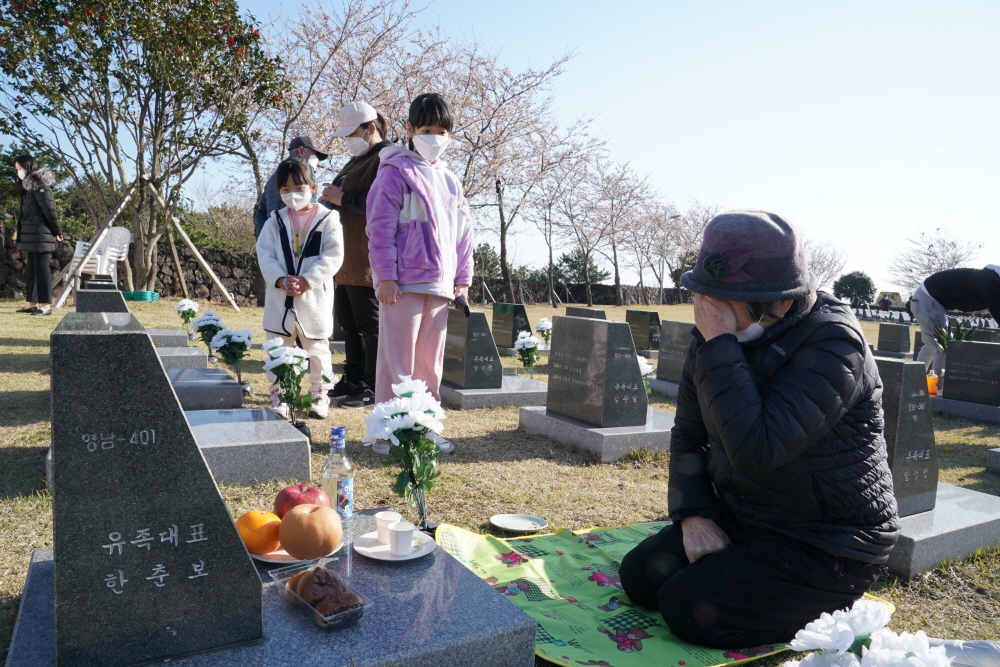
[A victim’s family visits the Tombstone for the Missing. The elderly lady’s children and granddaughter dare not console her grief.]
May the wind of change to meet the wishes of victims’ families
This year’s memorial ceremony was carried out with 299 people attending in accordance with the nation’s social distancing guidelines to prevent the spread of COVID-19.
The Jeju provincial government ran an online memorial hall on its website for those who were unable to attend the on-site memorial ceremony. It was notable that a metaverse was used for the first time to enable a virtual experience of the Jeju 4·3 Memorial Park. The system was established to allow individual online characters’ visit to the park’s Memorial Tablets Enshrinement Hall and the Tombstone Park for the Missing to offer a floral tribute and write in the guestbook.
The host agencies and divisions made every effort to successfully carry out the ceremony in terms of public relations, traffic management, and public safety. However, many of those bereaved families who were unable to attend the event expressed great frustration as they had to watch the event from outside the fence surrounding the event venue. Some of them were also seen protesting against the on-site officials for restricting their access to the ceremony to prevent the COVID-19 spread since 2020.
Meanwhile, political figures including President-elect Yoon Suk-yeol, Prime Minister Kim Boo-kyum, and the representatives of the ruling and opposition parties expressed their determination to work to resolve Jeju 4·3 in the new government. On top of that, good news continues in line with the passing of the revised Jeju 4·3 Special Act, concerning the payment of compensation to the victims and the acquittal of innocent convicts in the ex-officio or special retrials. The memorial ceremony is over this year, but the wind of change for the resolution of Jeju 4·3 is expected to meet the wishes of victims’ families who have been heartbroken all their lives.
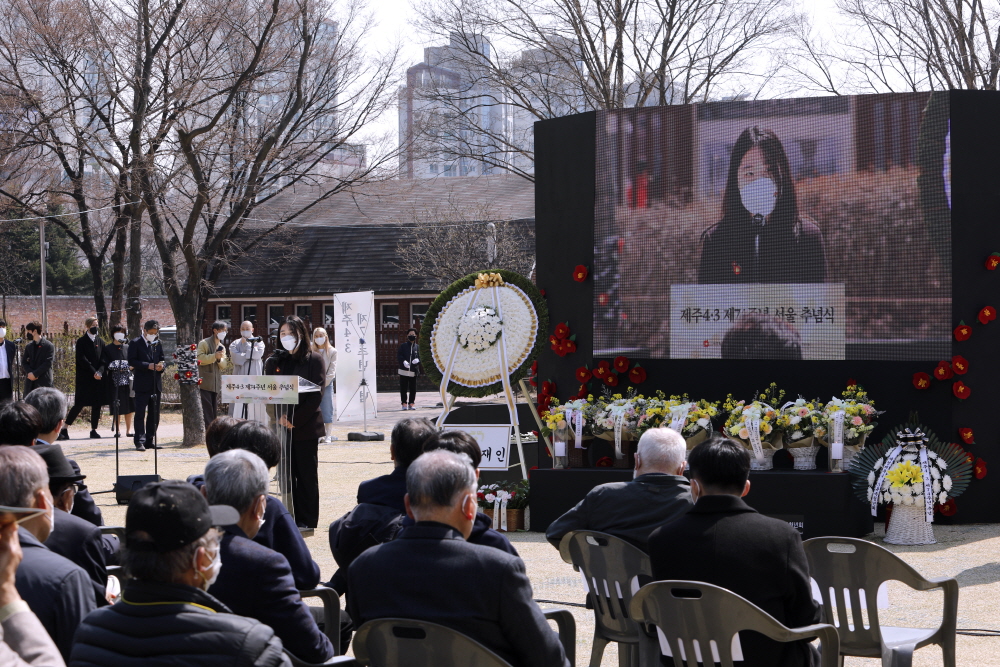
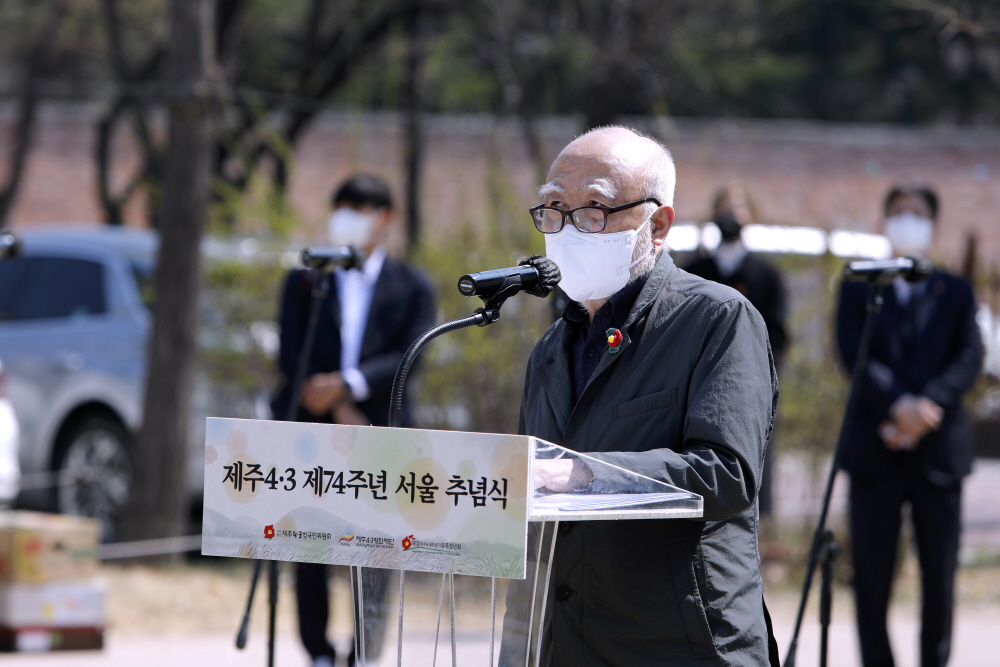
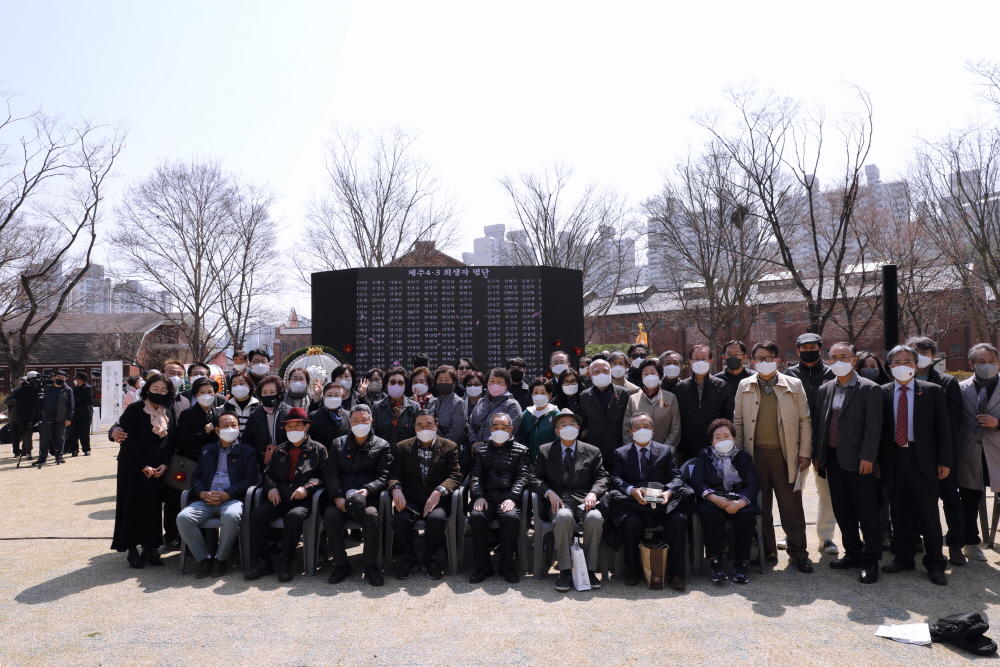
[Student representative Seo Ji-hye reads her letter (top). Novelist Hyun Ki-young (top right) also addresses members of various groups in attendance (middle).]
The Jeju 4·3 People’s Committee (President Chung Yeon-soon) organized the 74th Memorial Ceremony in Seoul for the Victims of Jeju 4·3 in the Seodaemun Prison History Center in Seodaemun-gu, Seoul, on April 3, 2022.
The ceremony was attended by Bu Cheong-ha, Chairperson of the Seoul Association of the Bereaved Families of Jeju 4·3 as well as Unification Minister Lee In-young, Reps. Song Young-gil and Park Joo-min of the Democratic Party of Korea, and Moon Seok-jin, head of the Seodaemun-gu Office. Other various organizations and institutes also participated in the event, including the members of the Association of the Bereaved Families of Post-Korean War Civilian Massacres Victims, Seoul Association of the Bereaved Families of Yeosu-Suncheon Incident, and Seoul Youth and Juvenile Association, as well as students of Magok Middle School. Unification Minister Lee said in his memorial speech that Jeju 4·3 is a history of just resistance and of victimization by state violence. “Last year, the Jeju 4·3 Special Act was revised and brought a new energy of peace despite the misery,” he said. Saying that the true significance of Jeju 4·3 will be recognized when its values are revived through peaceful national unification. “I ask for your company and solidarity until the day the nation is peacefully reunited,” he said.
Baek Gyeong-jin, permanent board member of the Jeju 4·3 People’s Committee, said his committee has endeavored to nationally and publicly promote Jeju 4·3 since the 70th anniversary of the tragic event. He expressed the association’s commitment by saying, “We will continue to widely spread the spirits reflected in Jeju 4·3, taking the support we received during this memorial ceremony as momentum.”
On the same day, the Jejudo Association of Seoul (Chairperson Heo Neung-pil) also held a memorial ceremony in the association’s conference room. The event was attended by some 70 people, including Kang Han-il, honorary chairperson of the Jejudo Association of Seoul, Heo Sang-su, chairperson of the Seoul Association of the Bereaved Families of Jeju 4·3 Victims, and members of the Seoul Association of the Bereaved Families of Jeju 4·3 Victims.
Memorial Address by President Moon Jae-in — “I will always remember the spring heralded on Jeju”
On the 74th anniversary of Jeju 4·3, spring has blossomed faithfully on the island of Jeju.
Although the pain was deep, the people of Jeju have tried to forgive those who are to blame and to sublime their suffering to the values of peace and human rights, even as they still carry the memories of their suffering.
Once again, I express my condolences and offer my respect to the victims of Jeju 4·3 who bloomed as canola flowers, and to their bereaved family members who rose above their grief, as well as to the people of Jeju Island.
Recently, the first ex officio trial and special trial was held for those convicted by unlawful court rulings during Jeju 4·3. The retrial was made possible as a result of the general amendment of the Jeju 4·3 Special Act. The prosecutor requested the acquittal of the entirety of the defendants, while the presiding judge read out a special ruling which expressed that the panel of judges sympathized with the suffering caused due to Jeju 4·3. The 73 defendants who had been convicted under false accusations were finally exonerated, and their family members responded with applause to the court ruling. It was a moment when wounds healed and spring bloomed on Jeju Island. It took a long time.
Because the Jeju 4·3 Special Act was legislated during the Kim Dae-jung administration, and because the Jeju 4·3 Incident Investigation Report was released and an official presidential apology was made during the Roh Moo-hyun administration, my administration was finally able to promote the general amendment of the Jeju 4·3 Special Act and the payment of compensation for the victims. Above all, however, it was the earnest hearts of Jeju residents that served as the driving force in revealing the truth. The hearts of those forgiving people who deeply embraced the military and police created the spring we enjoy today. Through the amendment of the Jeju 4·3 Special Act, we have come one step closer to the complete revelation of the truth of Jeju 4·3 and the restoration of honor of the victims. In 2018, the exhumation project wherein the remains of 11 victims were discovered was resumed eight years after it was suspended, while an ensuing investigation on the truth of Jeju 4·3 was launched in March of this year. Starting from the second half of the year, compensation will be made for the Jeju 4·3 victims.
It is my solemn hope that the souls of those who were found in Darangshigul Cave, incinerated and scattered without even a funeral 30 years ago will be comforted by the special Darangshigul Cave exhibit. “May the deceased close their eyes and the living take each other by the hand.” I still have a vivid memory of the epitaph, which I read in 2020 at Yeongmowon in Hagwi-ri, Jeju City. I have never seen such intense consolation and reconciliation. I believe that the incomplete tasks will be completed through the tolerance and solidarity of the living. I expect the efforts to continue be made as planned in the next administration. It was a great honor to stand for the people involved with the Jeju 4·3 efforts for five years. I will never forget the spring on Jeju in memory of the victims.
